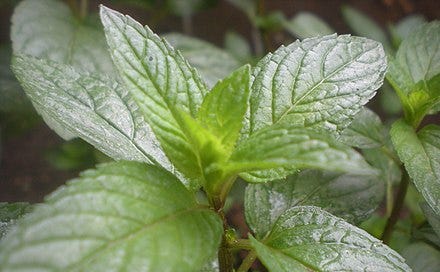Herbal Monograph: Peppermint
Peppermint has a long history of herbal use, such as alleviating digestive issues, headaches, and respiratory problems. Plus: cautionary notes for peppermint essential oil.
Common Name: Peppermint
Other Names: Mentha x piperita, Brandy mint, Lammint
Latin Name: Mentha piperita
Origin: Peppermint is native to Europe and Asia and is now cultivated worldwide.
Herbal Actions:
Peppermint has carminative, antispasmodic, analgesic, anti-inflammatory, antimicrobial, and stimulant actions.
Ayurveda Doshas:
Peppermint can help pacify Kapha and Pitta doshas.
Description:
Peppermint is a hardy, perennial herb that grows up to 30-90 cm tall. It has small purple flowers and bright green leaves with a characteristic minty aroma.
Common Uses:
Peppermint can be used for a variety of health conditions, including digestive issues like bloating, gas, and indigestion. It can also help soothe headaches, relieve menstrual cramps, calm tension and anxiety, and act as a natural breath freshener.
How to Use:
Peppermint (the plant, not the essential oil, see below) can be taken internally as a tea or tincture. It can also be used topically as a balm or oil. For peppermint tea, pour boiling water over 1-2 teaspoons of dried leaves, cover and steep for 5-10 minutes. Drink 2-3 cups a day.
Cautions:
Peppermint is generally considered safe, but some may experience mild side effects such as heartburn, allergic reactions, or skin irritation. Pregnant women and young children should avoid high doses of peppermint as it may cause adverse effects.
Counterindications:
Peppermint may interfere with certain medications or medical conditions, so it's important to consult with a healthcare provider before use. It should also be avoided by those with gastroesophageal reflux disease (GERD) or hiatal hernia as it can worsen symptoms.
Peppermint Essential Oil
Peppermint essential oil has various potential uses, including:
Relieving headache and migraine symptoms
Alleviating nausea and digestive issues (when inhaled, do not consume)
Reducing muscle and joint pain
Improving respiratory function
Restoring sense of smell lost due to COVID-19
Peppermint oil is safe when used properly in a diffuser. It should never be applied on the skin “neat” (without dilution) and never ingested. From MedicalNewsToday:
Pure peppermint essential oil is too concentrated to take orally, and it can be toxic at high doses. Although research has looked at the potential benefits of taking diluted amount of peppermint oil internally in enteric-coated formulations, current guidelines still advise against such practice due to the potential risks.
Thus, it's important to note that this essential oil should be used with caution, and when used for health concerns, under the guidance of a qualified holistic healthcare professional. Peppermint oil can have some potentially serious side effects and counterindications, such as:
Allergic reactions, especially for those who are allergic to the herb
May cause skin irritation or discomfort
Can interact with certain medications, such as antacids and blood thinners
Should be avoided during pregnancy and breastfeeding
Ingesting peppermint oil may cause vomiting, diarrhea, and even kidney damage
Consuming peppermint essential oil could damage the internal tissues of the esophagus and stomach
It is always best to do your research and consult with a qualified holistic healthcare professional before using essential oils for any purpose other than diffuser use, and to follow proper safety guidelines for their use.
Please note that essential oil MLM marketers often oversell the safety of so-called “pure” essential oils, when almost all essential oils are not safe to consume internally even if they are “pure.” Furthermore, many families of oils such as peppermint always need to be diluted before applying to the skin.
If you wish to get peppermint’s benefits through consuming it, it is far better to use the whole plant and not the essential oil. For example, if you want to use peppermint for digestive issues, you can either use the oil in a diffuser and/or have peppermint tea made from whole peppermint leaf, which is safe.
There is no need to take peppermint essential oil internally when the tea itself is highly beneficial and contains other phytonutrients that would be stripped from the essential oil.
In short, use the essential oil for diffusing and to add aroma to massage oils; use the herb (whole plant leaf) for teas and tinctures.






I was using this essential oil with my oil pulling regimen and have since stopped noticing an “allergic” response. I have heard you can create an allergy to essential oils if used liberally.
THere you go... using big words again! ;-p